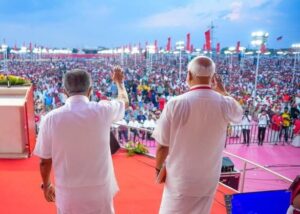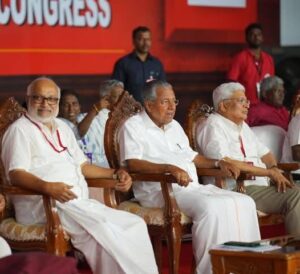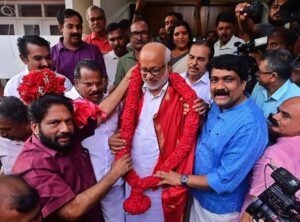Published Apr 24, 2025 | 9:00 AM ⚊ Updated Apr 24, 2025 | 9:00 AM

CPI(M) state secretary MV Govidan, and general secretary MA Baby, with Chief Minister Pinarayi Vijayan.
Synopsis: Politicians and analysts observe that MA Baby, as the general secretary of the CPI(M), might become a tool for Kerala Chief Minister Pinarayi Vijayan to extend his unyielding command over the party in Kerala to the national level.
A quiet tremor is rippling through Kerala’s Left citadel. The elevation of CPI(M) stalwart MA Baby as the party’s new general secretary has triggered a wave of speculation: Is this the dawn of a new power axis within the party’s most dominant unit, or a fresh endorsement of Chief Minister Pinarayi Vijayan’s unyielding command?
As the CPI(M) grapples with national decline but clings to relevance in Kerala, the leadership shift at the top has ignited hopes, doubts, and deep political curiosity. At 71, Baby is a seasoned Marxist, known for his intellectual persona and ideological clarity.
A former Kerala education and culture minister (2006–2011) and a two-time Rajya Sabha member, the Kollam native brings decades of political experience to the table.
His soft-spoken style, however, stands in stark contrast to Vijayan’s authoritative and pragmatic leadership.
While Baby is only the second leader from Kerala after EMS Namboodiripad to helm the party nationally, many see his appointment as more symbolic than transformative.
Party insiders point to the powerful Kerala lobby’s influence in his selection, reportedly proposed by former general secretary Prakash Karat and backed by the state unit.

CPI(M) general secretary M A Baby and Chief Minister Pinarayi Vijayan
courtesy – M A Baby FB
“While MA Baby is a seasoned leader with a strong ideological grounding, his role as the general secretary is likely to be shaped by the priorities of the Kerala unit, where Pinarayi Vijayan remains the dominant force,” observed a district-level CPI(M) leader.
Despite the prestige of his new role, Baby lacks an independent mass base or a loyal faction within the party.
“Let’s be clear: Baby becoming general secretary doesn’t mean he becomes the new power centre in Kerala. This elevation is more of a balancing act than a shake-up,” noted the leader.
Analysts, too, remain sceptical.
Joseph C Mathew, a left-leaning political commentator, told South First, “I don’t think Baby’s appointment will alter Kerala’s intra-party dynamics. He was a Polit Bureau member for 15 years but rarely took a firm stance on critical issues. His initial comments, especially on the ASHA workers’ protest, suggest he won’t challenge the Vijayan-led government.”
It is also being pointed out that his public defence of Vijayan’s daughter, T Veena, in the ongoing Serious Fraud Investigation Office (SFIO) probe into alleged illegal payments suggests a willingness to align with the chief minister’s camp.
By dismissing the allegations as politically motivated, Baby has positioned himself as a loyal ally, potentially reinforcing Vijayan’s control rather than challenging it.
Though his rise marks continuity within the Marxist cadre tradition, observers argue that real power in Kerala still rests firmly with the Pinarayi camp — from the state secretariat down to local committees.
Baby’s leadership, for now, appears to reflect the party’s consensus-driven caution, rather than a bold new direction.
According to a local committee leader, “It’s hard to envision Baby operating independently of Vijayan’s influence, given the state’s outsized role in the party’s national framework.”
At the same time, Baby as CPI(M)’s general secretary has spotlighted a simmering fault line within the party — one that underscores the Kerala unit’s growing dominance over its once-powerful counterpart in West Bengal.
It is being pointed out by party insiders that Baby’s victory over All India Kisan Sabha president Ashok Dhawale, backed by the Bengal and Maharashtra factions, reflects the steady erosion of influence among the party’s eastern bastions and the consolidation of power by its southern stronghold.
Kerala’s supremacy in the CPI(M) is rooted in its electoral vitality.
While the party has been reduced to a marginal force in both West Bengal and Tripura, Kerala remains its final fortress.

CPI(M) general secretary MA Baby, Chief Minister Pinarayi Vijayan and PB member Prakash Karat (MA Baby/Facebook)
Under Vijayan, the CPI(M)-led LDF scored back-to-back victories in 2016 and 2021 — a rare feat in the state’s political history.
It’s said that this winning streak has granted Kerala leaders like State Secretary MV Govindan considerable sway in the Central Committee and Polit Bureau, both increasingly seen as aligned with Kerala’s strategic priorities.
Baby’s elevation is widely interpreted as an attempt to maintain internal cohesion at a time when the party is grappling with irrelevance outside Kerala.
His non-confrontational style and deep roots within the Kerala unit make him a unifying figure rather than a disruptive one.
Analysts suggest his leadership will likely strengthen the “Pinarayi order,” projecting an image of ideological discipline and internal unity.
“Baby commands respect across factions, but he doesn’t provoke. That’s what the party needs right now — coherence over conflict,” remarked a CPI(M) leader.
The elevation of Baby is being widely seen as a strategic consolidation of the Kerala unit’s influence within the party’s national framework.
Given Baby’s known alignment with Vijayan on key ideological and policy matters, many observers view his appointment as a move that reinforces Vijayan’s dominance. However, beneath the surface of this apparent harmony, political analysts detect the early stirrings of a quiet recalibration.
“Baby’s ascent introduces a new power centre alongside Vijayan,” noted a CPI leader.
“His national stature gives him a platform to influence state-level decisions. The real question is whether he will use it to reinforce Vijayan’s agenda or carve out a more independent space within the party,” added the leader.

MA Baby receiving a warm welcome when he arrived at the AKG Centre in Thiruvananthapuram after being elected as general secretary.
Some believe Baby could evolve into a moderating force — offering a more nuanced, less combative response to contentious state issues compared to Vijayan’s often confrontational style.
His ideological convictions, rooted deeply in the party’s socio-political fabric, may enable him to steer debates towards internal democracy and collective leadership.
According to Joseph, “Compared to Sitaram Yechury, who was perceived — at least to some extent — as a potential threat to Pinarayi Vijayan’s authority, Baby is a far lesser threat. Yechury, to a large extent, was kept out of the loop regarding Kerala’s internal politics. But that won’t be the case with Baby. He knows the dynamics too well. While he hasn’t shown signs of open defiance, at some point, the fact that he’s the general secretary might compel him to intervene — subtly, but decisively.”
Left commentator NM Pearson echoed similar sentiments.
“Baby was never part of Vijayan’s trusted inner circle. But compared to Ashok Dhawale, he was a more acceptable choice for the Kerala faction. They might have calculated that Baby, at the very least, would safeguard their political priorities, especially in their dealings with the Congress,” Pearson told South First.
Pearson believes that while the impact may not be immediate, Baby’s rise could pave the way for a new power bloc within the CPI(M) — one that reshapes the party’s discourse over time.
For now, Baby’s leadership appears to serve the interests of the dominant Kerala faction. However, as he settles into his national role, his actions may well chart a different course — one that slowly reintroduces internal debate, encourages collective leadership, and subtly shifts the ideological contours of the party.
In that sense, Baby’s elevation is not just a reflection of Kerala’s clout — it might also mark the beginning of a deeper transformation within the CPI(M).
(Edited by Muhammed Fazil.)

